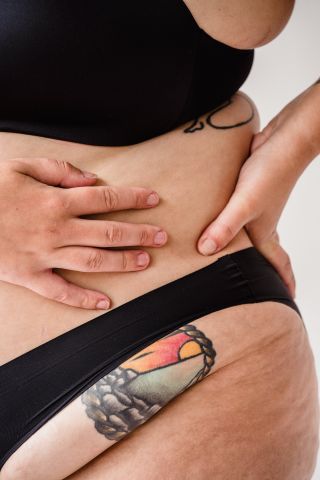Body Positivity
Fat and Sexy: How Body Positivity Is Smashing Fat Phobia
Body positivity is changing people’s relationships with themselves and others.
Updated February 5, 2024 Reviewed by Jessica Schrader
Key points
- Fat phobia can negatively impact the health care that clinicians provide for fat people.
- Fat people can be healthy, strong, vibrant, and sexy, even though popular culture assumes the opposite.
- Body positivity is valuing all bodies, regardless of size, shape, disability, age, race, height, etc.
Because fatness is in the eye of the beholder, and someone who is fat in Los Angeles might be skinny in Minneapolis, it is clear that fat is socially constructed. That does not mean there is no such thing as physical fat; obviously, it exists in the real world. But what counts as fat, and especially as “too fat,” varies significantly by region, subculture, and historical era. In the United States, the current idealized body for women is a cisgender person who is overall slender with a completely flat stomach, tiny waist, enormous booty, and gigantic breasts. Very few people are naturally shaped that way, and the rest of the population has a huge range of body fat distribution—some of which is decidedly stigmatized. The same amount of fat can be considered beautiful or ugly, unhealthy or healthy, depending on how it is distributed. Significant problems arise when people attach value and moral judgment to the ways they and others are shaped.
Assumptions About Fatness
In a society where racism, sexism, and even homophobia are no longer acceptable forms of public bigotry, it is still socially acceptable to insult or mock fat people in many circles. Comics can’t tell racist jokes anymore, but they sure can make fun of fat people. Research indicates that employers routinely discriminate against fat job candidates, and some families ruthlessly badger or shame their members who they deem too fat. Contemporary U.S. society sees fat people as somehow morally deficient, out-of-control gluttons who are more likely to be lower class and less intelligent than their highbrow and slender contemporaries.
These bigoted attitudes comprise fat phobia. Similar to the problems with the word homophobia, classifying it as a phobia is slightly misleading because that makes it sound like people can’t control their fear of fatness or gayness when in truth they could choose to refrain from hating someone simply because of their body shape or sexual orientation.
Realities About Fatness

Even though many people associate fatness with being unhealthy, there are lots of healthy fat people and loads of unhealthy skinny people. In other words, weight is not the sole determinant of health—even though many health care practitioners act as if it is. The Association of Size Diversity and Health (ASDH) is a nonprofit organization that works to combat size discrimination, especially in health care. Their program Health at Every Size (HAES) advocates that health care providers shift their understanding from health as an outcome of being slender and compliant with doctor’s orders to seeing health as a resource that is available to all people and takes a range of forms along a continuum.
HAES encompasses five primary principles:
- Weight inclusivity: accept and respect the diversity of body types, sizes, and shapes.
- Respectful care that refrains from shaming, stigmatizing, or bullying people with weight bias and stigma so that everyone has access to appropriate, compassionate, and professional care.
- Health enhancement advocates for policies that improve equity, accessibility, and well-being regardless of body size.
- Life-enhancing movement that supports people of all sizes to engage in whatever form of movement suits them best, to whatever degree they choose.
- Eating for well-being with flexible attitudes that encourage satisfaction of hunger, nutrition, and pleasure instead of dieting to lose weight.
Body Positivity & Neutrality
If you have ever watched Lizzo and the Big Girls dance their hearts out on stage, you know that fat bodies can be gorgeous, athletic, strong, and smoking hot. Rejecting assumptions that thinness is the same as being attractive or valuable, fat people are openly appreciating themselves and their larger bodies. Body positivity is the mindset of celebrating all different forms of physical bodies for the wonders that they are, regardless of size, (dis)ability, age, race, or shape. Some have expressed concern that body positivity has become weaponized toxic positivity for white women and is problematic because it retains a focus on how bodies look, rather than how they function or other aspects of people like their thoughts and personalities.

An alternative or evolution of body positivity, body neutrality suggests that we don't have to put so much focus on people's bodies, and we can think about and value other things besides people's physical forms. Diet culture presents fat people as waiting for life to start or to finally feel good about themselves once they lose weight or otherwise achieve popular cultural standards for the ideal body shape and size. Body positivity and neutrality counters that unrealistic ideal with the declaration that people of all shapes and sizes can enjoy their lives and feel good about themselves even when they do not fit cultural body ideals. Because we all fail to fit idealized bodily standards if we are lucky enough to get old, everyone can appreciate and engage in body positivity as a personal issue eventually.
Cultural Competence and Fatness
Health care practitioners must guard against the insidious and deleterious effects of fatphobia in order to protect their clients from discriminatory health care practices. Just like practitioners who serve the general public should face their racism, homophobia, or other forms of lurking stereotypes that influence them to provide some clients with substandard care, clinicians must ensure that they provide their fat clients with the same high-quality care that others receive. This means refraining from blaming every mental or physical ailment on fatness. Fat people have complex physical and emotional lives and there are many reasons that things happen, not only because people are fat.
Therapists, counselors, social workers, and other care providers can learn cultural competency to provide people of all sizes with high-quality care. Tamara Pincus, director of the Pincus Center,* suggests that practitioners who want to engage with body-positive clinical practices provide office spaces with armless chairs and spacious bathrooms, employ people with a diverse range of body sizes, and include intake questions about the ways in which diet culture has impacted clients.

A body- and sex-positive clinician, Pincus reports that her professional colleagues are too frequently inadequately prepared to serve fat clients. “Across the board, therapists need to understand more about their clients of size. For instance, the biology of fatness means that intentional weight loss does not work for the vast majority of people in the long term, and practitioners’ assumptions about peoples’ behaviors and health are often wrong. We need to listen to and believe the clients to help people of size embrace their lives as they are and develop good dating and sex lives. We have been taught in the larger culture that fat people are not attractive, but when you look at what people are really interested in one of the most frequently searched porn terms is BBW, big beautiful women, and BBM are out there too, there is more space to embrace the sexiness of fat men. Body-positive sexuality is there, it is just not acknowledged in the mainstream. Making sex more accessible for bigger people can mean broadening our view of what sex is, or maybe getting a wedge pillow, or some furniture, or some toys. Therapists can also help people see their fat bodies as sexy, great vehicles for pleasure, able to connect with their partners around the beauty and joy of fatness!”
*For full disclosure, I occasionally teach workshops at the Pincus Center.




